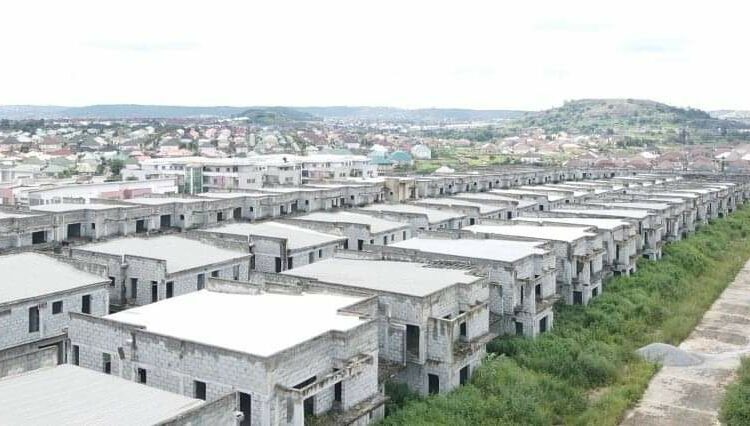
The controversy surrounding the ownership and forfeiture of 753 duplexes discovered by the Economic and Financial Crimes Commission (EFCC) will not go away until the commission answers nagging posers agitating the mind of the average Nigerian. While it is remarkable that the discovery is one of the commission’s anti-corruption most impressive achievements, if indeed the scheme constitutes proceedings arising from suspected fraud, the haul will not go unblemished until the seemingly polluted air around it is fully cleared.
One of the matters arising is relating to the opaqueness of the duplexes’ ownership. Who actually owns them? Another question is whether they are indeed proceeds of crime, and if so, what crime? Are the funds public or slush funds? More importantly, how does the state or any of its agencies operate in a way that allows suspected diversion or corruption of funds to be so huge that it can build 753 duplexes at a time?
Nigerians notice that the EFCC did not name the owner of the 753 duplexes and other apartments claimed to have been built with fraud proceeds on Plot 109, Cadastral Zone CO9, Lokogoma District in Abuja. This is demoralising and unacceptable. Until the owner of the houses is exposed to Nigerians, it will be difficult for the anti-graft agency to successfully dismiss the spreading allegation of a cover-up in the case, no matter the efforts it has put into what is now being described as the largest asset recovery in the country.
Nigerians believe that with the information gathered by the commission in the course of its investigation, it ought to have been able to establish the owner of the property, and no matter the proceedings adopted by the agency in court for the forfeiture of the houses to the government, it is necessary to make the name known to Nigerians. After all, the country belongs to all Nigerians, and if, indeed, funds belonging to Nigeria are being stolen or illegally diverted, Nigerians should know who is stealing their money and for what purpose.
The anti-corruption commission is a government agency, and it is manned by Nigerians whose expectation is that its operations should be carried out in the country’s best interest. It is bad enough that the country is now being run with borrowed money and the people are suffering unprecedented hardship as a consequence of corruption in the corridors of power, where the resources that ought to have been used to develop the country are being diverted to private ownership; it will be unpatriotic and unpardonable to hide the identity of the person(s), suspected to be behind the 753 duplexes. While the EFCC can be commended for the recovery, its failure to name the owner is a blot on its efforts. The agency should expose the persons behind the property to pass the transparency test.
Disclosing why it did not reveal the names of the individuals involved in the housing project, the commission reportedly said it would be unprofessional, adding that “substantive criminal investigation on the matter still continues.” A flurry of reactions has trailed the record-breaking recovery, with some people accusing the EFCC of cover-up of the true owners, an accusation the commission dismissed as unacceptable and grossly uncharitable. “The allegation of a cover-up of the identity of the promoters of the Estate stands logic on the head in the sense that the proceedings for the forfeiture of the Estate were in line with Section 17 of the Advance Fee Fraud Act, which is a civil proceeding that allows for action-in-rem rather than action-in-personam. The latter allows legal actions against a property, not an individual, especially in an unclaimed property. This Act allows you to take up a forfeiture proceeding against a chattel who is not a juristic person. This is exactly what the commission did in respect of the Estate.”
The EFCC went on to state: “The proceedings that yielded the final forfeiture of the Estate were products of actionable intelligence available to the Commission…The company flagged by our investigations denied ownership of the Estate following publications made in leading national newspapers. Based on this, the commission approached the court for an order of final forfeiture, which Justice Jude Onwuegbuzie of the Federal Capital Territory, FCT, High Court granted on Monday, December 2, 2024.”
Also praising what it called “the landmark forfeiture”, the EFCC said it was shocking that its critics are not concerned about “the systemic lassitude and unhelpful permissiveness that allowed such a monstrous corrupt act in the first instance,” warning that “Nigerians should gear up for more against lapses and loopholes in our system that continue to make the nation vulnerable to corrupt tendencies.”
The EFCC promised to safeguard the nation’s financial space against manipulators and organised brigandage. “It is important to note that the substantive criminal investigation on the matter still continues”, the commission noted, emphasising that “It will be unprofessional of the EFCC to go to town by mentioning names of individuals whose identities were not directly linked to any title document of the properties.”
To be continued tomorrow.






